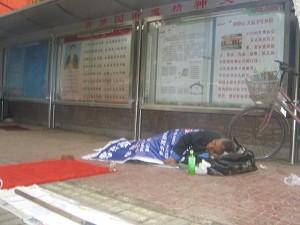More and more conflicts between police and appellants are emerging in Beijing as authorities begin implementing new regulations. Under the new law, “threatening an official by committing suicide or inflicting injuries to oneself” is a crime. Many appellants commented, “Currently in China, we don’t even have a right to die!”
According to information disclosed during the Xishan Conference, a high level close door debate over China’s reform is presently happening. Thirty million appeals occurred in China last year, and in Beijing, the conflicts between police and appellants are an everyday occurrence.
On May 26, a Chinese media reported that authorities explained about the new amendment to “Beijing Municipal Petitions Ordinance” on the 27th Conference of the Beijing Standing Committee of the Municipal People’s Congress held on May 25. It was stated that: Petitioners could not submit petition requests at locations that are not designated to receive petitions; not to exceed five persons when petitioning as a group; not to gather illegally; not to cause disturbance; not to seize or attack government organizations; not to block official vehicles; not to block or obstruct traffic; and not to threaten authorities by committing suicide, or inflicting injuries to oneself. Otherwise, the petitioners will be responsible for all corresponding legal implications.
An Epoch Times journalist interviewed several appellants regarding the new amendment.
Ms. Zhao from Beijing appealed for her property problems for years and was beaten by police officer, Wang Huaqian from Er-long Street Police Station. Due to the beatings she received, her ears were severely injured, her cranial nerve and facial nerves were damaged and her face muscles became paralyzed and distorted. She was unable to look after herself. During the Chinese congress sessions, the police detained her for 15 days to stop her from appealing. As a result, her health deteriorated and now she can hardly walk downstairs.
Zhao said, “the new ordinance for appellants have added over ten new stipulations, suicide is one of them. The regime does not give us means to survive, now it does not even allow us to die; the regime has taken total control of our lives. Not allowing us to kill ourselves, does that mean they want us to kill others? Authorities say suicide is an act that threatens the government, yet they have compelled us to the end of the rope. Nobody wants to appeal and nobody wants to suffer these hardships. I am going to hold up a big sign that says, ‘Officer, just give me a death permit!’ when I appeal next time.”

